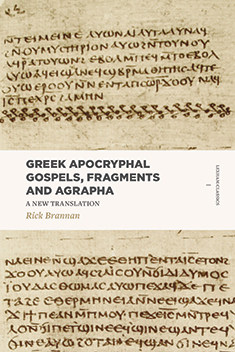The Greek Apocryphal Gospels, Fragments and Agrapha are documents that are not canonical. Some of them are just fragments that were found in dumps of papyri. But they give us insight into how early Christians dealt with their faith, how they told others about things they’d heard, and how they interacted with the myriad of stories and tales they were hearing about this guy Jesus and his disciples. These documents also teach us more about the Greek the early church used. Just think, something useful for historical studies and grammatical studies!
This resource includes gospels, which means it centers on things that tell the story of Jesus. Different people see different kinds of these gospels. I include three basic different types:
- Infancy Gospels. These include stories about Jesus’ youth and even earlier. The Protevangelium of James includes a much fuller story about Mary and Joseph with all sorts of details (even about Mary’s midwife) that are not canonical by any stretch, but insightful nonetheless.
- Passion Gospels. These are gospels about the trial, crucifixion and resurrection of Jesus. They have similarities with the canonical gospels, but include expansions and embellishments as well.
- Post-resurrection Gospels. The Greek extant for the Gospel of Mary is fragmentary, but insightful; one of the available fragments has a snippet of a story where Peter turns to Mary and asks her to relate what she knows of Jesus.
There are also fragments of apocryphal gospels. One of these, P.Egerton 2, is fantastic. It consists of a few fragments, but these compile in short succession a number of events that are easily recognizable in the canonical gospels. Again, we get to see how early Christians understood the canonical gospels, how they framed that material, and how they used it for other purposes.
Among the coolest things, from my perspective, are the agrapha. The word technically means “unwritten”; in this context it denotes sayings that claim to originate with Jesus but aren’t in the canonical gospels as we’ve received them. Some of my favorites of these are in the Apostolic Fathers, in the written work known as Second Clement, which is the earliest complete non-canonical sermon we’ve got today. In chapter 5, there is an allusion to Matt 10.16 / Luke 10.3, but with an expansion and a twist:
2 For the Lord said, “You will be like sheep among wolves.” 3 And answering, Peter said to him, “But if the wolves tear apart the sheep?” 4 Jesus said to Peter, “The sheep have no fear of the wolves after they are dead, and you have no fear of those who kill you and who are able to do nothing more to you, but you fear him who after you are dead has power to throw soul and body into the hell of fire.” (2 Clem 5.2–4)
Whether this was really something Jesus said, we have no idea. But isn’t it interesting that it would be used in the early church (early/mid second century) in a sermon?
What is in the resource?
The resource includes morphologically analyzed Greek of each of the included gospels, fragments, and agrapha. So it will be searchable and useable much like you’d use any morphologically analyzed Greek edition (NT, LXX, Apostolic Fathers, Philo, etc.). In addition, I’ll be writing introductions and providing bibliographies for each major document and fragment. The agrapha will probably have a single introduction and bibliography.
This is pretty much the same format we used for the Old Testament Greek Pseudepigrapha with Morphology. The goal is to provide a useable Greek text and, because the material is not that familiar to many, decent introductions to each of the major documents giving some background, history, and applicability to one’s studies of the Bible.
Get The Greek Apocryphal Gospels, Fragments and Agrapha today.





